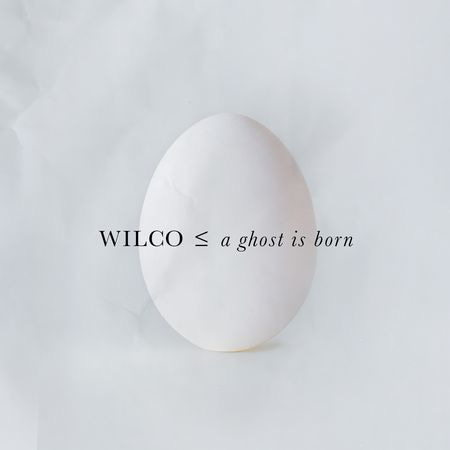improbable germany
Love and then frustration, this is how I feel when I listen to Improbable Germany, Wilco’s first take on their classic song, now titled Impossible Germany, recorded in Chicago in 2003. It frustrates me because of how much I love it, how much I want to keep it, put the way it makes me feel in a box or a word or something I can keep and do something with, but I can’t, because there’s nothing to do with it, and even worse, the part that I love is so small and particular, it is fleeting and subtle, barely a twenty-second stretch of music: Jeff Tweedy, vocals soft - echoes the “whispery, spiderweb-thin delivery” of Elliott Smith - over a fragile refrain, Now I know, you’re not listening, I know you’re not listening, quiet enough to hear the creak as he travels up the neck of the guitar into the high frets, gentle notes, they barely twinkle into earshot, light caressing the surface of water, it signifies a return, or an embrace, or something important I can’t make sense of that makes me feel weak and warm and wholly inadequate in my ability to articulate what it is that I mean or really want except maybe to abandon my initiative to make sense altogether, a surrender.
The song is about love and war: “improbable Germany, unlikely Japan.” It has a tendency to change colour when tilted in the light. Sometimes when I listen to the last part of the song I hear the sun splintering over the water, and other times I see bright white bombs raining from the sky, a last desperate bid for a paradox of peace. Sometimes parents are hauling sleeping children out of car seats and sometimes young soot faced boys are taking up arms. It raises natural questions of what do love and war have in common? Do things ever change? What contact will keep us together, apart? Why do I do insane, deeply irrational things?
Like all Wilco songs the lyrics are evocative nonsense, they are vivid and evasive at once, tucked several layers below rational comprehension. In other songs Tweedy evokes: “the sun coming up like a piece of toast” — “I am an American aquarium drinker, I assassin down the avenue” — “she holds my hand between her knees, it’s like a dream I never know what it means.” Wilco’s prolific discography is replete with nonsense and noise, patterned with codes, which circle around the difficulty and the virtue and chaos of getting through clearly to another human being. Even the name ‘wilco’ is slang formerly used for military radio transmission, ‘wilco, Sir’ — short for ‘will comply’, an acknowledgment of receipt.
Though he resists final interpretation, it feels fair to draw on Tweedy’s personal history as informant for this obsession. He writes in his memoir, Let’s Go (So We Can Get Back) on having suffered from migraines all of his life: "My migraines were connected to mood disorders ... Who knows where the mood disorders ended and the migraines began? ... the migraines were a way of making psychic pain visible to the people around me." Recording A Ghost is Born while severely addicted to opiates and see-sawing between reprieve and withdrawal, Tweedy’s only redeeming behaviour at this time was avoiding recording tracks while high, resulting in even worse migraines that are are audible throughout the album: the tracks are filled with “glacial electronic drones” and “repetitive mechanical noises arranged to mimic the isolating alien landscapes migraines often induce when the pain wraps itself so tightly around your skull it starts to warp your perception of light and time”. Listen to Handshake Drugs, where you can hear anticipation, bassy verve, self-loathing, and in the last minute, total deterioration.
I love his memoir because it manages to grapple with a history with addiction in an unusually honest way. There’s Tweedy, standing at the pharmacy giving his number to a teenage fanboy dispenser to coerce opiates from him; there he is stealing painkillers from his terminally ill mother-in-law; there he is dumping his psychiatrist who insists that his deep unhappiness makes his music better, and also that it is only in his health’s interest that Tweedy should allow him to accompany him on world tour. These events are written in plain enough fact to reflect the wretchedness of addiction, without the obfuscation of self-pity, or romanticisation; no pressing on the wound to make it burn brighter.
And it is clear somehow that it is a memoir written from a time and place cradled by love, it is compassionate and disarmingly funny and more syrupy warm than Vicodin. He inserts entire transcripts of his wife (as well as his own son) reminiscing on the bygone days of his rehab admissions:
‘Honey, are you gay?’ is a crazy line to be doing on your crashed out drug addict husband, and God, it’s just so sweet and funny.
He writes about the strange man his dad’s age, also in rehab, who walked past him practicing on the guitar for a concert that he was too rehab-admitted to be able to rehearse with his band for. The man looked at him and said: “You know what, son? You’ve got something special. All you’re lacking is confidence.” And this is one thing that saves him.
He writes with this keen sensitivity to how lucky he is to ever have been given the benefit of the doubt at his lowest; how much suffering he has caused those around him and how grateful he is that they had ever bothered to stick around; and an understanding that the only thing one can ever do to pay back the love one receives is to, do nothing, just receive it.
Love and war: one begins, and the other ends, in surrender.
At the time I was just thinking how desperately people want to believe something isn’t going to happen, and then it happens.
Jeff Tweedy on the opening lyrics to (now-titled) Impossible Germany.
Separately, in his disarmingly plain wisdom, Tweedy reflects on how the original recording ‘Improbable Germany’ transformed into the studio track ‘Impossible Germany’:
I always forget that things change, but they do.
Change is tragedy, chaos; change is evolution, hope.
Thinking about this phrase, ‘Impossible Germany, Unlikely Japan’, I assumed it was a gesture at unthinkable tragedy, set off by mechanical historical determinism; being totally blindsided despite the writing on the wall. When I think about Tweedy’s recovery, and the way that he writes with so much earnestness and belief in creativity as play rather than suffering, I wonder something else about the phrase, if it indicates the way personal and political history recedes from our comprehension to give way to new and open territory, we forget the way things change, several reviews including Ezra Klein seem to interpret this as a song about the loneliness of travel, not war, and I, I don’t know, I’m sure I’m overcooking it, I just guess what it means is all up to me.
And that’s what I love about Wilco’s lyrical nonsense - the opportunity for the infinite reinvention of meaning.
I’d hesitate to use the word transcendent to describe live music, but this is about as close as it gets. As one of the comments for one of the many versions of this song on YouTube has it “I thought my heart was going to burst during this song.” Every time mate, every time.
Review by Guy Lincoln
Then, the guitar starts. At exactly 2:45 into the song, guitarist Nels Cline strikes a single, sweet note. The drums and bass are keeping the rhythm. Above the quiet, consistent music Cline softly twirls and tumbles. Tweedy and Pat Sansone on rhythm guitars arpeggiate independently of each other as Cline’s solo grows a little louder, becomes a little more purposeful.The twirls become flourishes. The tumbles become colorful illustrations. Cline finds a melody, which he builds upon and repeats. At 4:09 Tweedy and Sansone fall into a harmonic duet, playing sharp, lovely triplets behind Cline’s tumbling and twirling. Now the band is a single unit. The volume goes up. The intensity builds. Cline is shredding, and the once quiet song is now a dissonant, lovely wall of sound. And then the drums and bass go away. Cline stops playing, and all we here are the sweet sounds of Tweedy and Sansone playing the same melody that begins the song. Quiet. Lovely.
There are no more lyrics to be sung, there is nothing more to be said. The song ends. Impossible. Perfect.
Review by Larry Glickman




beautiful song and piece. enjoyed learning more about the song, there’s truly so much lore hidden in the margins